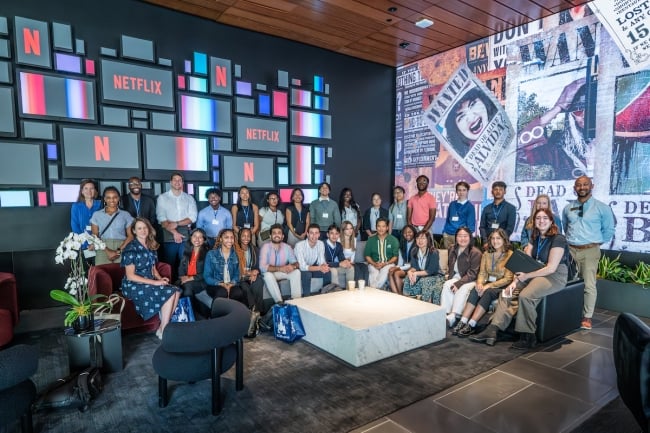You have /5 articles left.
Sign up for a free account or log in.

Emory University undergraduate students participated in a career trek to Los Angeles in January. The students, Emory staff and faculty visited Netflix headquarters, hosted by three alumni.
Emory University
To create more opportunities for students to explore potential careers after graduation and engage with employers, colleges and universities host short trips focused on careers, called career treks.
A winter 2023 Student Voice survey by Inside Higher Ed and College Pulse points to a need for campus career centers to engage more students. Among the undergrad respondents, 27 percent had used their career center for career planning and 19 percent have used it for networking.
What it is: A career trek is a short trip organized by an institution that exposes students to different careers and professionals in a new city. Often, the trips take place during the winter term, before internship season begins in the summer.
Depending on the college, sometimes students are responsible for paying their airfare or a small fee, but the institution typically covers the logistics onsite.
Career treks often take place at domestic centers of industry, such as Washington, D.C., New York City, San Francisco or Los Angeles, but others take students abroad or introduce them to professionals in a city near campus.
How it works: During a career trek, students typically engage in:
- Professional development. In pre-program training, students learn how to make the most of their experiences, including training in professional dress and etiquette, networking and career goal setting. End-of-program reflection also helps students discuss their experiences and create next steps in their career mapping.
- Employer connections. Career center staff solicit alumni to meet with students who share information about their work and provide advice about career exploration. Amherst College arranged an alumni dinner during its career trek to Washington, D.C.
- Workplace tours. While in the host city, students complete site visits at different employers, many of whom are alumni of the college or university. The tours highlight a day in the life of a professional and the interworkings of the organization.
Survey Says
An October 2023 report found 43 percent of traditional-age college students had professional networking opportunities in college—that number declines among racial and ethnic minorities and first-generation students.
Around half of alumni also said they decided their career only after obtaining their bachelor’s degree.
Things to consider: For higher education practitioners interested in creating their own career trek, here are three trends.
- Identify student populations. While a career trek can benefit all types of students, the trip can be targeted to specific groups who may need additional help in their career development. For example, the University of Arizona hosted its first student-athlete career trek in January, offering a two-day off-campus experience to students participating in Arizona athletics. Students learned how their skills in athletics can be transferrable to a professional setting and how they can market themselves.
- Make it major-specific. Some locations attract a specific type of student, but major- or discipline-specific treks can provide some additional guidance around opportunities available to learners from their field. Bowdoin offered an Arts Trek and InvesTrek to New York City in 2023 for students interested in the arts and investments, respectively.
- Incorporate fun, service. In addition to exposure to career opportunities, a career trek can highlight what life looks like for a young professional in the city. In a communications career trek to Florida, Elon University students also volunteered, visited the beach and spent a day at Disney parks. Emory University students, on a trek to Los Angeles, visited the Santa Monica Pier, the Grammy Museum and the Breakfast Club.
Do you have a career prep tip that might help others encourage student success? Tell us about it.




